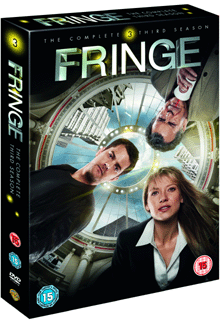
The third season of Fringe; so good that it can only have come from a parallel universe! At least, that’s the way it might seem when compared to the show’s frustrating and muddled early days.
Beginning life as a promising spin on the X-Files format, it soon became evident that Fringe couldn’t quite build on that promise. With the exception of John Noble’s wonderful Walter Bishop, none of the main characters really came alive on the screen, and despite some terrific and disturbing cold-opens and ideas, episodes would often merely trundle along and peter out in perfunctory manner.
Thankfully, somewhere in the middle of Season 2, when it looked like the show might be cancelled, the writers decided to just go for broke and embrace the fantastical science-fiction ideas that were always bubbling under the surface. And the show flourished!
We open with a follow-on from the second season’s cliff-hanger, with Olivia held prisoner in the parallel universe that is waging war against ours, and with the parallel Olivia (or ‘Fauxlivia’, as the internet eventually dubbed her) successfully imbedded into our world, with Peter and Walter none the wiser. Olivia is experimented on until she believes that she is the Olivia from the parallel world, and from then on the season takes a structural leap that is a stroke of genius.
For the first half of the season, the episodes alternate; one in our universe, one in the other (the title sequence is different for each universe, just to help clarify which you’re getting). As executive producer J.H. Wyman enthuses in one of the documentaries on this release, “We get to make two shows about one show!”
This master-stroke allows each stand-alone episode – traditionally the least interesting side of Fringe – to be steeped in enough intrigue and wider threat to be as fascinating as the arc-heavy episodes. Fauxlivia trying to keep her cover (and act upon evil Walternate’s mysterious orders) and Peter’s increasing suspicion of her add suspense to episodes in our universe, while the “over there” episodes have a whole other world to explore. The “over there” episodes are probably stronger, if only because they allow Anna Torv to finally let her hair down and have a little fun.
Olivia has always been a problematic lead character. She’s so by the book that she often comes across as humourless and lacking charisma. On the other side, that’s not the case, and Torv clearly relishes in playing an Olivia with a little more life and spark to her.
Unfortunately, towards the season’s end she’s asked to play something else entirely. It might be considered a spoiler to reveal what, but suffice to say that it’s a failed experiment by the show and it renders the (mercifully) few episodes that deal with it nearly unwatchable. Thankfully that’s immediately balanced by a far more successful experiment in the form of a hugely impressive half-animated episode (under the guise of an LSD trip).
There are also alternate versions of Broyles (the always reliable Lance Reddick) and Astrid to explore (no Peter, obviously…), while the “over there” Fringe division still has Kirk Acevedo’s Charlie Francis (again, given much more life than the version we once knew), as well a new face in Seth Gabel’s Lincoln Lee, whose eventual cameo as a very different Lee in our universe cements him as a welcome addition to the cast.
There’s also strong work from The Wire’s Andre Royo in a recurring guest-role. In fact, the enemy from the other universe is so well humanised, and the characters over there so sympathetic, that you might even find yourself siding with them! There are certainly no black-and-white, good-and-bad divides in this show.
As the trans-dimensional war between universes heats up, Fringe definitely makes the leap into reaching the sci-fi heights that it was always designed to reach. Once the initial novelty of the alternating episode structure wears off, there is a dip in quality, but there are other highlights – another flashback episode, complete with glorious 1980s-style title sequence – and the aforementioned poor (and unnecessary) plot decision isn’t enough to derail the whole series.
By the finale, Fringe is back on track and finally puts Peter Bishop face-to-face with his destiny, ending with a cliff-hanger that it will be fascinating to see the show try to resolve in Season 4.
![]()
Extras: A pretty good showing, with several commentaries (though none with cast or big-name producers) and a gag reel, although the real meat is in a collection of short documentaries. There’s a 4-part exploration of the parallel universe idea called ‘Duality of Worlds’, which features talking-heads from the whole cast and crew grappling with the ideas of having mirror-versions of themselves (employing a cheeky split-screen to highlight the issue), and the various scientific and moral conundrums that stem from that.
There’s also a short piece detailing the genesis of the animated episode. Interesting stuff; just be sure to prepare yourselves for Anna Torv and John Noble’s natural Australian accents…
![]()
Released on DVD and Blu-ray on Monday 26th September 2011 by Warner Home Video.
> Buy the DVD boxset on Amazon.
What did you think of Season 3? Let us know below…
Watch an exclusive clip…

